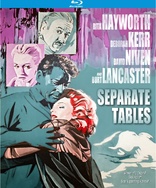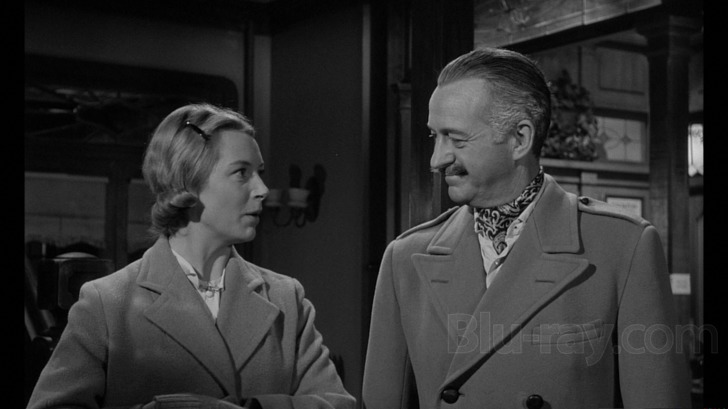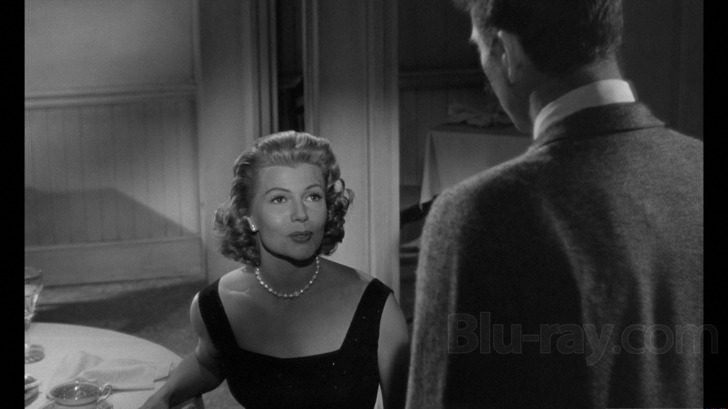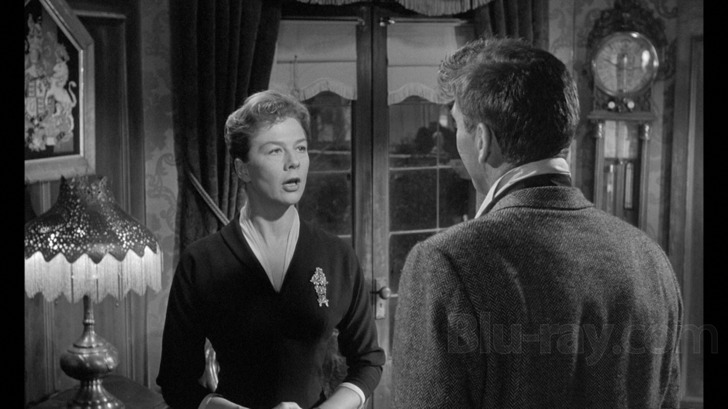Separate Tables Blu-ray Movie
HomeSeparate Tables Blu-ray Movie 
Kino Lorber | 1958 | 100 min | Not rated | Jul 29, 2014
Movie rating
7.2 | / 10 |
Blu-ray rating
| Users | 0.0 | |
| Reviewer | 4.0 | |
| Overall | 4.0 |
Overview
Separate Tables (1958)
The guests gather for a life-changing night at the Beauregard Hotel in Bournemouth, an English seaside resort town. The landlady, Pat Cooper, is the lover of failed alcoholic writer John Malcolm, whose life is thrown into turmoil when his estranged ex-wife, Ann, unexpectedly and mysteriously comes to the hotel. Other guests include the matronly Mrs. Railton-Bell and her withdrawn daughter, the spinster Sibyl, who is fascinated by Major Pollack and his colorful stories of his North African military exploits. Based on two one-act plays by Terence Rattigan.
Starring: Deborah Kerr, Rita Hayworth, David Niven, Wendy Hiller, Burt LancasterDirector: Delbert Mann
| Romance | 100% |
| Drama | Insignificant |
Specifications
Video
Video codec: MPEG-4 AVC
Video resolution: 1080p
Aspect ratio: 1.66:1
Original aspect ratio: 1.85:1
Audio
English: DTS-HD Master Audio 2.0 Mono (48kHz, 16-bit)
Subtitles
English
Discs
25GB Blu-ray Disc
Single disc (1 BD)
Playback
Region A (B, C untested)
Review
Rating summary
| Movie | 4.0 | |
| Video | 4.0 | |
| Audio | 4.0 | |
| Extras | 1.5 | |
| Overall | 4.0 |
Separate Tables Blu-ray Movie Review
All together now.
Reviewed by Jeffrey Kauffman July 12, 2014Separate Tables serves as one of the more interesting examples of how creative filmmakers can adapt a stage property to the medium of cinema. Terrence Rattigan’s original play was actually two plays, appropriately separate one acts which were united by location (a hotel in the southern England retirement village of Bournemouth) and supporting characters (mostly workers or residents of the hotel). In other ways, including leading characters and even timeframe, the two one acts were substantially different. The original stage version relied on the conceit of the same leading performers acting the different main roles in each of the one acts, while the supporting cast was carried over between the two. Could a film be properly fashioned from such a disparate source? Under the watchful eye of original author Rattigan, along with some help from John Gay, Separate Tables made it to film rather surprisingly well. Removing the conceit of two actors playing four roles and also setting all of the events of the two one acts in one simultaneously unfolding plot arguably helped increase the film’s already considerable emotional pull. That said, the film isn’t entirely successful in (literally) recasting its roles. The original stage version was uniformly British, and the film, perhaps bowing to the inevitable market pressures that probably required American stars, introduces Burt Lancaster (who also co-produced) and Rita Hayworth as two of the leading players. Perhaps surprisingly given these stars’ iconic reputations and backgrounds, they turn out to be the relative weak links in an otherwise sterling array of English actors, two of whom (David Niven and Wendy Hiller) brought home Academy Awards for their work in the film.

The film’s credits close with a kind of amusing text card which “advertises” the charms of the Hotel Beauregard, the Bournemouth boarding house which serves as the location for all of Separate Tables (see screenshot 19). The establishment advertises not just its “fine cuisine”, but an added inducement for the world weary traveler (and/or boarder): they won’t have to endure communal sitting at meals, for the hotel offers “separate tables”. Interestingly, the film’s retooling of the two original one act plays actually makes the dining room one of the first place where the formerly separate characters end up seeing each other, if not initially interacting.
The film’s four main characters are all misfits of a sort, and some of them have secrets in their past which bubble up at various points, providing much of the film’s central drama. We first meet the dowdy Sibyl Railton-Bell (Deborah Kerr), a middle aged spinster who may suffer from some nervous problems. Sibyl is quietly attracted to another resident at the hotel, the “veddy, veddy British” Major Angus Pollock (David Niven), an attraction which brings the potent disapproval of Sibyl’s controlling mother (Gladys Cooper). Soon enough the hotel’s guest list is augmented by Ann Shankland (Rita Hayworth), a once glamorous woman who is not facing middle age calmly. She seems to have some sort of past with the simultaneously arriving John Malcolm (Burt Lancaster), but what that past is only becomes apparent as further plot pieces fall into place. Knitting this disparate crew together is the hotel’s manager, Pat Cooper (Wendy Hiller), an efficient woman who seems to be the very embodiment of that famous World War II British slogan “keep calm and carry on”.
Separate Tables is at times just slightly on the tawdry side, especially with regard to what turns out to be a love triangle involving John, Ann and Pat, but it’s to Rattigan’s credit that this slightly smarmy feeling provides some good opportunities for Hiller especially to strut her refined but obviously deeply felt stuff. Lancaster perhaps mistakes exuberance for a true performance style here, while Hayworth seems to take the exact opposite tack, offering a fairly passive interpretation of an admittedly depressive character. The plot involving the Major and Sibyl is actually almost shocking in a way, especially for a 1957 film. Kerr, who proved in Black Narcissus she can “do” repression better than just about anyone, is here probably more oppressed as Sibyl, living under the imperious thumb of her mother. But her inward looking performance is one of the film’s highlights (pay attention to how often her eyes are downcast and her entire physical demeanor seems to almost fold in on itself). A scandal involving the Major’s past allows the usually elegant Niven to show a somewhat more unseemly, if simultaneously weirdly vulnerable, quality that many of his films never permitted him to do.
Despite sounding in the included commentary like he was far from completely satisfied with how Separate Tables turned out, director Delbert Mann actually crafts a largely compelling film here. While it’s more than obvious the entire film is studio bound, despite some supposed “exterior” shots, the actual ambience created by the production design (which Mann evidently supervised, at least according to his commentary) is quite real feeling, with the slightly stuffy confines of the Hotel Beauregard becoming almost a secondary character. The supporting cast is full of fantastic performers, including a memorable turn by original stage version cast member May Hallatt as Miss Meacham, the always enjoyable Cathleen Nesbitt as a dowager who suspects the Major isn't everything he pretends to be, and Rod Taylor and Audrey Dalton as two young lovers who haven’t quite become the desperate characters that the older quartet of main characters have.
Separate Tables Blu-ray Movie, Video Quality 

Separate Tables is presented on Blu-ray courtesy of Kino Lorber Studio Classics with an AVC encoded 1080p transfer in 1.66:1. Filmed entirely on studio sets (despite some ostensible "outdoor" locations) by the great Charles Lang (who received one of the film's seven Academy Award nominations for his black and white cinematography), Separate Tables looks great in high definition for the most part, and certainly exhibits none of the variable clarity and sharpness that occasionally muddied the simultaneously released Witness for the Prosecution. Both blacks and gray scale are consistent throughout this presentation, and the image is completely stable, easily resolving even natty textures like the houndstooth coat Lancaster wears in some scenes. Grain looks natural most of the time, though is a bit on the heavy side on one or two occasions (you'll see a noticeable uptick in the scene where Lancaster and Hiller have their secret meeting in the darkened hotel). Contrast is just slightly variable at times, adding a very minor murkiness to selected moments, but this is by and large an excellent looking release and one that augurs well for Kino Lorber's new glut of releases of vintage catalog films.
Separate Tables Blu-ray Movie, Audio Quality 

Separate Tables's lossless DTS-HD Master Audio 2.0 mono mix suffices quite well for what is in essence a very talky, dialogue driven film. David Raksin's Oscar nominated score is rather understated but sounds great in this lossless setting. (The less said about the Vic Damone warbled title song, which was evidently cut into the film over Mann's objections, the better.) Fidelity is excellent throughout the track, and there are no problems of any kind to report.
Separate Tables Blu-ray Movie, Special Features and Extras 

- Audio Commentary with Director Delbert Mann. Mann takes no prisoners in this fascinating if at times slightly accusatory sounding commentary. It sounds as if the film was actually wrested from his control in post production (something that's kind of surprising considering the film's reputation, not to mention its Oscar nomination for Best Picture), and he was evidently not entirely happy with some of the decisions that were made subsequent to his removal, including the addition of a title song and some editing choices.
- Trailer (1080p; 2:26)
Separate Tables Blu-ray Movie, Overall Score and Recommendation 

Separate Tables offers a surprisingly adroit tour through several roiling "adult" dramas as it brings together the four characters who appeared in two separate one acts in Terrence Rattigan's original play. The film's revisionism works surprisingly well here, though it's obvious that there are two simultaneously unfolding plots, rather than one cohesive whole. There are some unexpectedly tawdry elements here, but they're handled with aplomb by the British players at least. Lancaster and Hayworth certainly don't embarrass themselves, but they don't quite seem to fit in with the rest of the cast. This Blu-ray has all around excellent technical merits, and while the supplements may seem slight, the Mann commentary is extremely worthwhile. Highly recommended.
Similar titles
Similar titles you might also like

Some Came Running
Warner Archive Collection
1958

The Wild One
1953

A Kind of Loving
1962

Cinderella Liberty
Limited Edition to 3000
1973

Sayonara
Limited Edition to 3000
1957

Marty
4K Restoration
1955

Picnic
Limited Edition to 3000 - SOLD OUT
1955

Ten North Frederick
Limited Edition to 3000
1958

Ryan's Daughter
1970

Caught
1949

Suddenly
1954

Seven Days in May
Warner Archive Collection
1964

On the Beach
1959

Lone Star
1996

Not as a Stranger
1955

The Best of Everything
Limited Edition to 3000
1959

Big Night
1996

Blackboard Jungle
1955

The Night of the Iguana
Warner Archive Collection
1964

Advise & Consent
1962